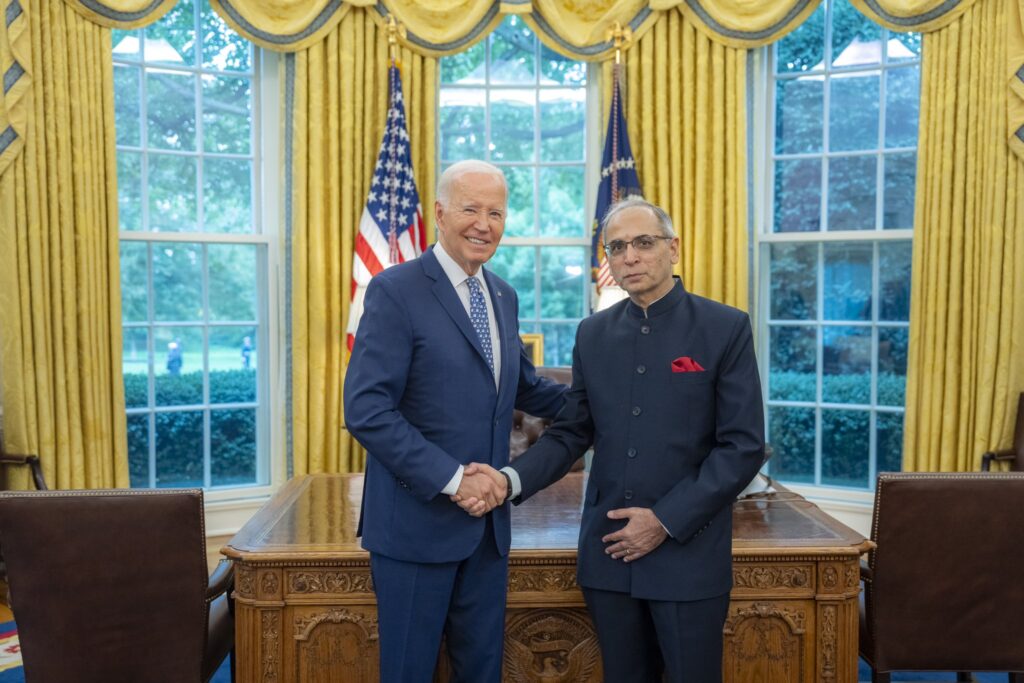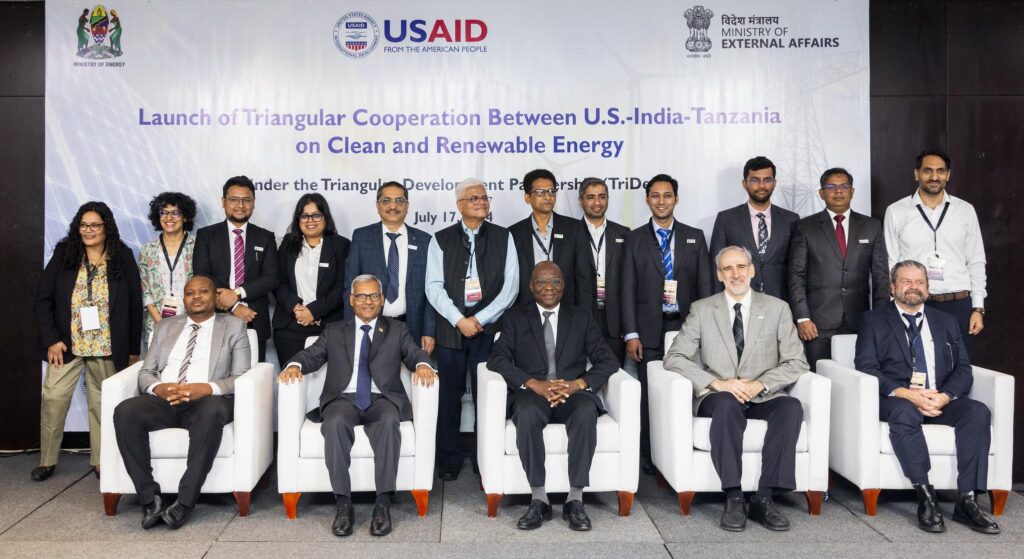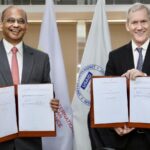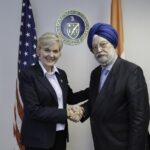The U.S. Agency for International Development (USAID) Administrator, Samantha Power, and India’s new Ambassador to the United States, Vinay Kwatra, met and discussed emerging strategic opportunities between both countries on October 7, 2024, in Washington D.C.
During their meeting, the officials reviewed ongoing collaborative efforts between the U.S. and India in the Indo-Pacific region under the Triangular Development Partnership (TriDeP), a USAID funded program, and reaffirmed their dedication to the U.S.-India Climate and Clean Energy Agenda 2030 Partnership.

“The Administrator highlighted opportunities to build on the U.S. and India’s evolving strategic development partnership to address shared global goals and emphasized our joint work in the Indo-Pacific under the Triangular Development Partnership (TriDeP),” noted USAID Spokesperson Benjamin Suarato in a statement on October 8th. “Administrator Power and Ambassador Kwatra discussed India’s leadership role in catalyzing regional clean energy ambitions, and Administrator Power reaffirmed USAID’s commitment to the U.S.-India Climate and Clean Energy Agenda 2030 Partnership.”
The Asia Foundation noted that the United States and India share a mutual vision for a “free and open Indo-Pacific region.” Per the Foundation, the TriDeP initiative has been designed to expand India’s development cooperation within the Indo-Pacific, working towards common regional development goals. Under this program, India’s position “as a development leader and preferred partner in the Indo-Pacific,” will be further strengthened in partnership with the U.S.
According to the Asia Foundation, TriDeP focuses on three key priority areas where India showcases “policy leadership, practical experience, and sustainable results.” It added that across the region, TriDeP will foster demand-driven partnerships, including through triangular cooperation, guided by the “4E approach: engage, explore, expand, and establish.”
The Asia Foundation is serving as the implementation partner of TriDep to strengthen the development cooperation between India and the U.S. in the Indo-Pacific region and beyond.
A report titled, “India-U.S. Triangular Development Partnership: Renewable Energy: Establishing India-U.S. Triangular Development Cooperation Partnerships in the Indo-Pacific Region,” published by USAID and The Asia Foundation, emphasized India’s leadership in policy and technical expertise in sectors such as Disaster Risk Reduction, Climate-Smart Agriculture, and Renewable Energy. The report positions India as a key provider of sustainable solutions in these fields.
On July 17th of this year, the United States, India, and Tanzania also launched a TriDep initiative aimed at enhancing energy infrastructure and advancing renewable energy initiatives in Tanzania.

A statement issued by USAID following the launch highlighted that this innovative clean energy alliance is the first of its kind in Africa.
It noted that the Asia Foundation, will “leverage each country’s combined capacities, resulting in a stronger grid, improved regulatory and policy frameworks, reliable regional interconnections, and the development of utility-scale solar projects in Tanzania.”
The statement stressed the collaboration between USAID and India’s Centers of Excellence, including the Grid Controller of India Limited and the NTPC School of Business, to involve Tanzania’s policymakers, regulators, utilities, academic institutions, and the private sector. The overarching goal of this partnership is to increase the adoption of renewable energy within the country and foster climate-smart energy investments, it pointed out.
A Joint Fact Sheet: “The United States and India Continue to Expand Comprehensive and Global Strategic Partnership,” released by the White House on the sidelines of the bilateral meeting between President Joe Biden and Prime Minister Narendra Modi on September 21, 2024, noted both leaders welcomed the strengthening trilateral cooperation with Tanzania through TriDep.
On the sidelines of the 2021 Leaders Climate Summit, the United States and India launched the U.S.-India Climate and Clean Energy Agenda 2030 Partnership on April 22nd. The partnership envisions bilateral cooperation between both countries to implement robust measures this decade, aimed at achieving goals of the Paris Agreement.
According to a State Department statement, the Partnership is designed along two main tracks: the Strategic Clean Energy Partnership, co-chaired by Secretary of Energy Jennifer Granholm, and the Climate Action and Finance Mobilization Dialogue, co-chaired by Special Presidential Envoy for Climate John Kerry.
The announcement followed the visit by Presidential Envoy Kerry to India, where he and PM Modi on April 7th, affirmed that the United States and India would collaborate on a 2030 agenda for clean technologies and climate action.






